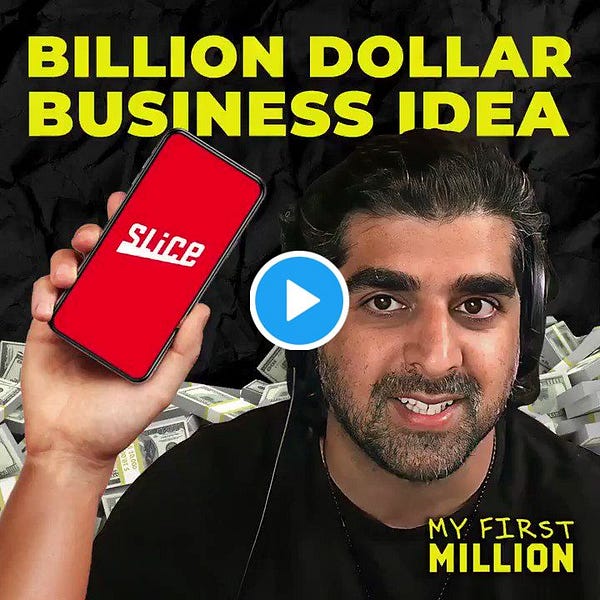💡The art of generating an idea
Issue 6 🪜: Founder's framework for generating ideas + maybe someone's hobby can be your next startup idea.
Hey everyone👋, welcome to the 17th newsletter.
This is an illusion that you need a perfect startup idea to get the motivation to pursue it or make it successful. What you can do is start with a small idea that will lead to faster results and will motivate you to do more.
Why do most people who try to find startup ideas fail? Because they simply try to sit & think about finding an idea that leads to too many bad ideas and ultimately fails miserably.
When you see things aren't working, it’s not the idea that failed as it's in the early stage but the possibility of you taking it from 0 - 1 determines the success & scope of the idea.
On average I get 1 idea each alternative day. Some of them helped me create 2 successful products.
Other times, they often lead to enthusiasm, planning, and working. Only after a while I realize that that excitement was for the moment & in reality the idea doesn’t make sense.
And then there are times when I have to creatively find an idea. It’s hard to get that way but if you have a framework you’re easy to go.
A 3-step framework to generate a startup idea.
Surely, each one has its own or can create one but this is how most founders get startup ideas.
Spot the idea through different means (listed down below), thoroughly explore these areas.
See if you have any chance to enter the market or create the market.
How can you make a difference or capture downstream from the existing ones? Because many ideas do come from downstream ideas. (Ex - how can you make Slack more collaborative and cheap).
Look for ideas that are helping bridge the gap between making the work easier for founders and users both.
Founders idea
If you look at successful founders you’ll see they were bridging the gap between their experience with other products or services. They were able to notice the opportunities they can build through it.
Often when a founder gets a startup idea, they can’t tell if it can be turned into a giant company? Because startup success doesn’t only depend upon the idea alone. Once you have an idea you’ll test it on a small group of people to see if it will work or not.
You can either have an idea that some people want right now or in the future. If you’re building something that users don’t want right now but you know they’ll use in the future, won’t work today. Even a small group of people need something today & are happy to use the crappy version of your app, then that’s the idea you need to work on immediately.
It’s said in the best way - It's even better when you're both a creator and the target user, because then the cycle of generating new versions and testing them on users can happen inside one head.
The worst thing founders do is hide their ideas. They think someone will steal it. But in reality, early-stage ideas are rarely that developed, once you openly talk and share your idea maybe you’ll find a different direction to move with it (See how founders are building in public).

Organic ideas
When ideas come naturally to you, you’ll have a story that inspires you to work on it & you’ll know that it’s a promising idea that won’t fail.
Often with such ideas, you’ll be solving a problem with your product, knowing where did the problem come from will help you craft a good story that users can relate to. Now, the problem doesn’t need to come from you only sometimes the idea comes from other’s problems.
Most of the idea reflect these things:
The frustration you want to reduce
Providing something cost-effective
Something which is trending
Emotionally driven
These are some possible places through which you can generate ideas:
Pay attention to your surroundings,
Your daily problems or problems you’ve faced in your life,
Things you enjoy doing or you’re an expert in,
Talking with people or colleagues,
If your team rejects your idea you can consider building it as a side project,
Something you see online,
Brainstorming yourself or with your team (keep it small, a large team often leads to no conclusions),
Storyboards, mentors, market, while using a product, customers, employees, research data, technology, etc.
The easiest way to spot an idea from others is: Signup newsletters, subscribe to YouTube channels, Podcasts, try products, read things.

Ideas on demand
Sometimes you’ll need to generate an idea immediately, maybe because your first idea didn’t work and to move on you need a new idea. That’s when you have to generate ideas on demand.
When you’re looking for an idea on demand turn off these features -
What’s missing in this product?
What the current users don’t like about the product?
What do these people want that no one’s giving?
How can I make this idea a big company?
How can I make something as successful as others?
This is not the right way to find an idea because your focus is in the wrong direction. Free your mind, change your environment and you’ll be able to find ideas on demand.
Forcing yourself to search for a startup idea will lead you to disrupts. The idea comes in an instant space like lightning. Most of them should be/needs to be something you’re facing or happen in your day-to-day life.
Lastly, 🚪
The idea is more about finding a problem to solve than being satisfied by the concept.
Basically, having a perspective that leads to a very interesting and curious life, helps the idea evolve with every stage. Whether you’re starting a new life, college, or a company.
One thing I always say, evolution comes through ideas. Example: there will be a big replacement of the search engine, I don’t know what will come but it’s already happening and in the coming next decade you’ll see more changes with the things you use daily or are dependent on. Today, you don’t have to go to Google to search best alternative products or something new that’s launched but you go to Product Hunt.
But the idea itself isn’t enough. To understand if the idea can be a startup, you need to test the idea. It’s important because founders often don’t know what to do after having an idea or accomplishing a step. The process of turning it into a startup and then something revolutionary requires execution.
Ideas from Twitter 🐦




Until next time 👋.
👋 PS: I’m Ritika founder, product marketer and advisor for early-stage startups, find more here or connect with her here. If you’re a first-time founder looking for curated resources, download here. If you enjoyed this post, read the past issues here. You can also promote your product in this newsletter.
A big thanks for reading & sharing!





